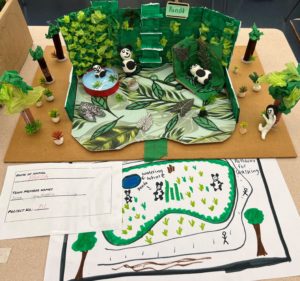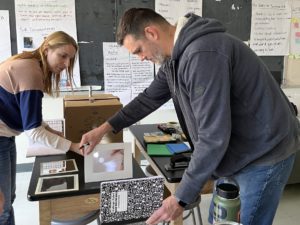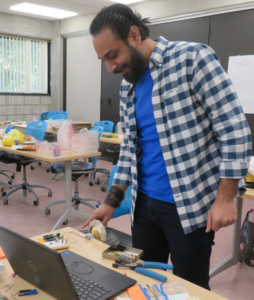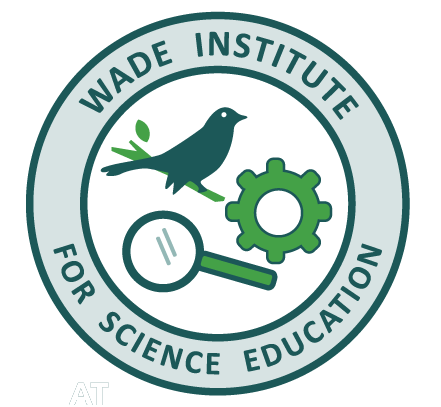Thursday, February 2, 2023
For Immediate Release
Wade Institute Recognized as a High Quality
Professional Learning Provider
Quincy, MA – The Wade Institute for Science Education, a Massachusetts-based science education nonprofit, has a long history of bringing together Massachusetts STEM providers and stakeholders with resources and expertise in order to provide high quality professional development opportunities for educators who then directly impact student science learning outcomes. Since its inception in the 1980s, the organization has continually adapted to address the ever-changing professional learning needs of K-12 teachers and informal educators. Collaborations have included museums, nature centers, wildlife sanctuaries, research facilities, businesses, technology centers, and higher education institutions in Massachusetts and across the United States. The goal is simple: engage teachers in inquiry-based science learning through collaborations with leading local science organizations and thus promote and enable high quality science education for all learners.
The Wade Institute is a Massachusetts Professional Development Point provider, an OpenSciEd Certified Professional Learning Provider, included in the Rivet Education Professional Learning Partner Guide, and a provider of Approved Courses for Massachusetts Department of Elementary and Secondary Education’s Accelerating Science: Open Access Professional Learning. Education Specialists, who work directly with partners and educators for programming, have worked at the local, state, and national levels in order to keep current about the evolving educational landscape and to facilitate long-term change in the field of science education. Wade Institute educators have experience developing state science learning standards, assessing science learning, working with STEM stakeholders through professional organizations and committees, conducting field research, teaching in formal and informal settings, designing standards-aligned teacher resources such as weather and climate strand maps, and coaching science educators through professional learning experiences. Their pedagogical expertise is in inquiry-based, place-based, and phenomena-based learning.
State-Level STEM Involvement
The Wade Institute has worked closely with various state-level entities over the years. Staff and Board members served on the MA State Advisory Committee for the Next Generation Science Standards and assisted with the development of the MA 2016 revised Science and Technology/Engineering Standards. In order to expand high-quality STEM education for students across the state, the Wade Institute participated in MA STEM Advisory Council meetings as well as regional STEM Network events. The STEM Advisory Council seeks to expand STEM skills, guided pathways into STEM learning and careers, and employer partnerships for economic and workforce development. MA Regional STEM Networks are resource hubs that connect educators with community leaders and STEM professionals to further excite students for STEM.
Massachusetts STEM Week & STEM Challenges
The Massachusetts STEM Week is sponsored by the Executive Office of Education and the MA STEM Advisory Council. It is an initiative designed to inspire all students, especially those from underserved communities, to persistently pursue STEM activities, education, and careers. STEM Challenges are funded by a grant from the MA STEM Advisory Council.

During a STEM Challenge Fair, Freetown Lakeville Regional School District shared the results of their participation in the Wade Institute 2022 STEM Challenge, “Extreme Zoo Makeover: A STEM Approach to Habitat Design.”
In 2020, the Wade Institute held its first STEM Challenge as part of the Massachusetts STEM Week. Challenges provided opportunities for students to explore science topics and engage in science through hands-on, minds-on investigations that encouraged them to envision themselves in STEM careers. These unique experiences integrated science concepts and the engineering design process in an exciting way. The Wade Institute’s 2020 – 2022 STEM Challenges brought together local STEM providers (the National Marine Life Center, the Lloyd Center for the Environment, Salem Sound Coastwatch, and Buttonwood Park Zoo) to immerse teachers in hands-on professional learning workshops that provided curriculum, training, and materials kits for classroom implementation of the Challenge. Challenges enabled teachers to utilize grade-level appropriate science and technology concepts in one overarching school challenge. Classes designed a water movement system on a remote island, built a transport vessel and water movement system during a hurricane, and designed a model habitat for wildlife in a zoo environment.
OpenSciEd-Certified Professional Learning Provider
OpenSciEd is a nationally-recognized, high-quality, open source curriculum that has been pilot tested by Massachusetts schools. Massachusetts is one of 10 partner states that helped to create these open-source, K-12 science instructional materials, addressing the need for science instructional materials designed for the Next General Science Standards (NGSS) and the Massachusetts Science and Technology/Engineering Curriculum Frameworks. OpenSciEd supports equitable science learning, as it is centered on phenomena-based storyline units that empower students to steer their own learning through immersive and interactive inquiry-based investigations. The Massachusetts OpenSciEd Scope and Sequence of Units Recommendation is available from the Massachusetts Department of Elementary and Secondary Education.
The Wade Institute’s Education Specialists underwent extensive training in 2021 in order to become the first Massachusetts-based OpenSciEd Certified Professional Learning Provider. Qualifications include: internal capacity, commitment to quality, and commitment to collaboration. This certification enabled the Wade Institute to expand existing Customized Professional Learning Services that are tailored to the professional learning needs of schools and school districts to offer OpenSciEd Professional Learning in support of schools transitioning to the curriculum. So far, the Wade Institute has worked with six Massachusetts school districts to support the schools’ adoption of the following OpenSciEd components: Phenomena-based learning, Driving Question Boards, Storyline Teaching, Storyline Routines, Progress Trackers, and Discourse and Teacher Moves.

Bridgewater-Raynham Regional School district teachers investigate light reflection and refraction during a Wade Institute OpenSciEd Professional Learning program.
Rivet Education Professional Learning Partner Guide
Rivet Education promotes excellence in science education instruction. It is the only company in the United States that evaluates High-Quality Professional Learning. The Rivet Education Professional Learning Partner Guide is a national tool to support High Quality Instruction Materials implementation in all classrooms. Organizations are selected for inclusion in the “best in class” guidebook based on their existing credentials, caliber of their professional learning offerings, and ability to provide educators with high quality resources. By combining High Quality Instruction Materials (HQIM) with High-Quality Training, or Professional Learning (HQPL), providers can enhance student learning outcomes and promote more equitable learning in science. In 2022, the Wade Institute was selected for inclusion in the Rivet Education Professional Learning Partner Guide.
Approved Courses for Massachusetts Department of Elementary and Secondary Education’s Accelerating Science: Open Access Professional Learning
The organization’s successes and achievements led to the receipt of a state sponsorship for professional learning offerings in 2023. The Wade Institute was one of seven organizations vetted by the state as qualified to offer approved courses for the Massachusetts Department of Elementary and Secondary Education’s Accelerating Science: Open Access Professional Learning (OAPL) program, which seeks to strengthen educators’ knowledge base for engaging their students in scientific thinking using a collaborative, student-driven, and phenomena-based approach to science instruction. These professional learning opportunities are free for eligible Massachusetts educators.

An educator investigates coding sensors and engineering design concepts during the two-day Focus Workshop, “Engaging Students in the Engineering Process Using Sensors.”
The Wade Institute’s 2023 OAPL professional learning opportunities include four two-day Focus Workshops and a week-long Summer Professional Development Institute. Workshops tap the expertise and resources of collaborating partners from the Springfield Science Museum, Bassett Planetarium (part of the Beneski Museum at Amherst College), the New England Botanic Garden at Tower Hill, and the Blackstone River Valley National Heritage Corridor to engage educators in inquiry-based experiences that explore STEAM and Earth science, storyline teaching and phenomena, as well as coding and engineering design concepts. The institute in collaboration with Manomet, Inc. will dive into the phenomena of migration of whales, sharks, turtles and birds using data and engage educators in place-based science investigations that they can use in their classrooms. Learn more about the Wade Institute’s Approved Courses for the MA DESE’s Accelerating Science: Open Access Professional Learning program at https://www.wadeinstitutema.org/oapl.
What’s Next?
As science education evolves, so does the Wade Institute. Stay informed about organizational news and upcoming high quality, hands-on, minds-on, inquiry-based professional learning opportunities by visiting www.wadeinstitutema.org, signing up for the Wade Institute’s mailing list, and following the Wade Institute on social media. Contact us directly to schedule Customized Professional Learning Services or OpenSciEd Professional Learning for your school or school district!
###
The Wade Institute for Science Education specializes in providing inquiry-based, hands-on, minds-on, science, technology and engineering professional development for K-12 teachers and informal educators. For more information, visit www.wadeinstitutema.org or call 617-328-1515.
